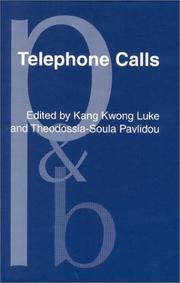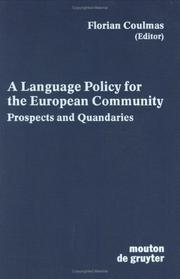| Listing 1 - 10 of 10 |
Sort by
|
Book
ISBN: 9789027256447 9789027270849 9027256446 9027270848 1461957990 9781461957997 1306453755 9781306453752 Year: 2014 Volume: 239 Publisher: Amsterdam: John Benjamins,
Abstract | Keywords | Export | Availability | Bookmark
 Loading...
Loading...Choose an application
- Reference Manager
- EndNote
- RefWorks (Direct export to RefWorks)
This chapter examines the referential domain, communicative function and perlocutionary effect of the first person plural pronoun we in dialogic and monologic British political discourse. Its methodological framework is an integrated one, combining interactional sociolinguistics, in particular co-occurrence and conversational inference, with quantitative and qualitative corpus analysis. The first part presents the methodological framework, focussing on the two types of discourse and the genre-specific distribution of self-references expressing collectivity considering the pronoun we<
Lexicology. Semantics --- Pragmatics --- Grammar, Comparative and general --- Collective nouns --- Personal pronouns. --- English language --- 'we' (persoonlijk voornaamwoord). --- Discoursanalyse --- Collective nouns. --- Pronoun. --- Sociale aspecten. --- Pragmatics. --- Semantics. --- Grammar, Comparative and general. --- Language and languages --- Philosophy. --- Comparative grammar --- Grammar --- Grammar, Philosophical --- Grammar, Universal --- Philosophical grammar --- Formal semantics --- Semasiology --- Semiology (Semantics) --- Pragmalinguistics --- Grammar, Comparative --- Linguistics --- Philology --- Comparative linguistics --- Information theory --- Lexicology --- Meaning (Psychology) --- General semantics --- Logic, Symbolic and mathematical --- Semantics (Philosophy) --- Philosophy --- Grammar, Comparative and general - Collective nouns

ISBN: 3871183148 Year: 1978 Publisher: Hamburg Buske
Abstract | Keywords | Export | Availability | Bookmark
 Loading...
Loading...Choose an application
- Reference Manager
- EndNote
- RefWorks (Direct export to RefWorks)
Act (Philosophy) --- Communication --- Reasoning --- Truth --- Conviction --- Belief and doubt --- Philosophy --- Skepticism --- Certainty --- Necessity (Philosophy) --- Pragmatism --- Argumentation --- Ratiocination --- Reason --- Thought and thinking --- Judgment (Logic) --- Logic --- Communication, Primitive --- Mass communication --- Sociology --- Action (Philosophy) --- Agent (Philosophy) --- Act (Philosophy). --- Communication. --- Reasoning. --- Truth.

ISBN: 9027253412 1588112195 9786612160998 1282160990 9027296227 9789027296221 9781282160996 6612160993 Year: 2002 Publisher: Amsterdam Benjamins
Abstract | Keywords | Export | Availability | Bookmark
 Loading...
Loading...Choose an application
- Reference Manager
- EndNote
- RefWorks (Direct export to RefWorks)
Telephone conversation is one of the most common forms of communication in contemporary society. For the first time in human history, some people are spending as much time, if not more, talking on the telephone as they are on face-to-face conversations. The aims of this book are: to bring together in one volume research on telephone conversations in different languages, to compare and contrast people's methods of handling telephone conversational tasks in different communities, and to explore the relationship between telephone conversational practice and cultural settings. The papers are based on first-hand, naturally-occurring data obtained from a variety of languages, including Chinese, Dutch, English, French, German, Greek, Japanese, Korean, and Persian. Theoretical and methodological issues pertaining to research on telephone conversations are discussed.
Pragmatics --- Communication & Mass Media --- Journalism & Communications --- Conversation analysis. --- Language and culture. --- Telephone calls. --- Calls, Phone --- Calls, Telephone --- Phone calls --- Oral communication --- Telephone --- Culture --- Analysis of conversation --- CA (Interpersonal communication) --- Conversational analysis
Book

ISBN: 0955358612 Year: 2006 Publisher: York Raw Nerve Books
Abstract | Keywords | Export | Availability | Bookmark
 Loading...
Loading...Choose an application
- Reference Manager
- EndNote
- RefWorks (Direct export to RefWorks)
Sociology of the family. Sociology of sexuality --- Didactic strategies --- Educational sciences --- Feminism --- Women's studies --- Book --- Europe


ISBN: 9783110877137 9783110128697 Year: 2013 Publisher: Berlin ;; Boston De Gruyter Mouton
Abstract | Keywords | Export | Availability | Bookmark
 Loading...
Loading...Choose an application
- Reference Manager
- EndNote
- RefWorks (Direct export to RefWorks)
Digital

ISBN: 9783111355160 9783484103818 Year: 2011 Publisher: Tübingen Max Niemeyer Verlag
Abstract | Keywords | Export | Availability | Bookmark
 Loading...
Loading...Choose an application
- Reference Manager
- EndNote
- RefWorks (Direct export to RefWorks)
Digital

ISBN: 9783110214406 9783110375022 9783110214390 Year: 2014 Publisher: Berlin ;; Boston De Gruyter Mouton
Abstract | Keywords | Export | Availability | Bookmark
 Loading...
Loading...Choose an application
- Reference Manager
- EndNote
- RefWorks (Direct export to RefWorks)
Digital

ISBN: 9783111612294 9783484301191 Year: 2012 Publisher: Tübingen Max Niemeyer Verlag
Abstract | Keywords | Export | Availability | Bookmark
 Loading...
Loading...Choose an application
- Reference Manager
- EndNote
- RefWorks (Direct export to RefWorks)
Digital

ISBN: 9783111678139 9783484103436 Year: 2011 Publisher: Tübingen Max Niemeyer Verlag
Abstract | Keywords | Export | Availability | Bookmark
 Loading...
Loading...Choose an application
- Reference Manager
- EndNote
- RefWorks (Direct export to RefWorks)
Digital

ISBN: 9783112578063 9783112578056 Year: 2022 Publisher: Berlin ;; Boston De Gruyter
Abstract | Keywords | Export | Availability | Bookmark
 Loading...
Loading...Choose an application
- Reference Manager
- EndNote
- RefWorks (Direct export to RefWorks)
| Listing 1 - 10 of 10 |
Sort by
|

 Search
Search Feedback
Feedback About UniCat
About UniCat  Help
Help News
News